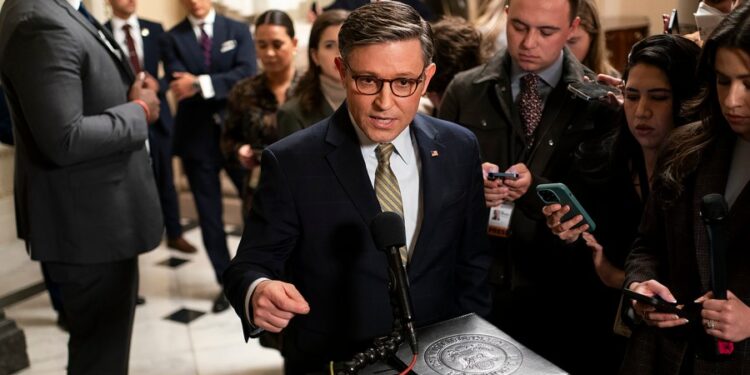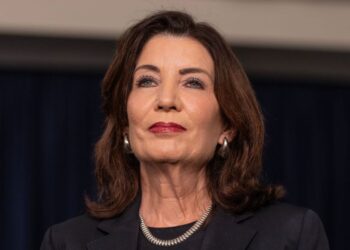
About a dozen lawmakers remain major question marks in Speaker Mike Johnson’s (R-La.) quest to win a floor vote for the gavel Friday.
While specific interests of the holdouts vary, those declining to support Johnson generally want him to commit to spending cuts and give them assurances that rank-and-file members will be involved in negotiations for high-stakes legislation moving forward, multiple sources told The Hill.
The House clerk will call on lawmakers in alphabetical order when the vote starts early Friday afternoon.
Assuming all members of the House are present and voting for a candidate, Johnson can afford to lose only one Republican.
Here are lawmakers to keep an eye on in the Speaker vote, the majority of whom were in meetings with Johnson on Thursday:
Rep. Andy Biggs (R-Ariz.): Biggs, a former chair of the House Freedom Caucus, has historically taken a more aggressive stance in key Speakership matters than some of his Freedom Caucus colleagues. He voted “present” on the 15th Speaker ballot in January 2023 that handed former Speaker Kevin McCarthy (R-Calif.) the gavel, and he was one of eight Republicans who ousted McCarthy nine months later.
“There are some issues I think that need to be worked out, specifically dealing with the budget issues,” Biggs said on Fox News shortly after President-elect Trump endorsed Johnson on Monday.
Rep. Lauren Boebert (R-Colo.): The firebrand conservative and Freedom Caucus member told former Rep. Matt Gaetz (R-Ga.) in an interview on his new show on One America News Network that a commitment from Johnson to making Rep. Chip Roy (R-Texas) chair of the House Rules Committee would “secure the vote on the first round with no significant battle.”
Roy is one of several members seeking to lead the powerful panel but is seen as an extreme long shot for the job given his history of voting against Republican procedural votes, called rules, on the House floor. The decision on the chair rests solely with Johnson.
Rep. Tim Burchett (R-Tenn.): Burchett, one of the eight Republicans who voted to oust McCarthy, has said Trump’s endorsement will likely deliver Johnson the votes he needs to secure the Speakership.
“I think the die has been cast,” Burchett told Fox News on Monday.
But as of Thursday morning, Burchett told The Hill he was uncommitted on supporting Johnson.
Rep. Eric Burlison (R-Mo.): Burlison had called Johnson’s handling of a December short-term spending bill a “total dumpster fire,” a sentiment echoed by a number of those refusing to commit to reelect the Speaker.
Rep. Michael Cloud (R-Texas): Cloud said coming out of Johnson’s office Thursday that getting to a yes on Johnson has “been the goal all along” and that the meeting was “productive.” But shortly after in a post on the social platform X, Cloud was more cryptic.
“There are concerns that a delay in electing a Speaker could lead to a brief delay in enacting President Trump’s agenda. This a legitimate concern that I share. The other option on the table is maintaining the status quo, which will undoubtedly fail Trump’s agenda. I’m working to help find a third option. We must ensure the House is structured to enact the America-First agenda in a way that has permanence,” Cloud, a Freedom Caucus member, said.
Rep. Andrew Clyde (R-Ga.): Clyde left Johnson’s office Thursday declining to say if he had gotten to a yes, joking: “We were working on Project 2025.”
“There will be a Republican Speaker,” Clyde said.
Rep. Eli Crane (R-Ariz.): Crane, who was spotted leaving Johnson’s office Thursday, told The Hill in December that the spending bill panned by hard-line conservatives affected how he was thinking about his vote for Speaker. Crane was one of the Republicans who voted to oust McCarthy.
Rep. Andy Harris (R-Md.): Harris, the newly reelected chair of the House Freedom Caucus, had a key role in negotiating an internal House GOP deal to raise the threshold to trigger the “motion to vacate” the Speaker to nine members, helping Johnson get unanimously renominated as Speaker in November.
And even as Johnson was facing backlash on an initial short-term funding bill, Harris said he still supported Johnson. But that changed a few days later, when Harris said he was “undecided on what leadership should look like in the 119th Congress,” citing concerns about new spending not offset by cuts.
Multiple sources said Harris has aired annoyance about how funding for the rebuilding of the Francis Scott Key Bridge in Baltimore was handled in December’s spending bill. Harris wanted the bill to prevent renaming of the bridge — something activists had called for because Key owned slaves — and wanted a project labor agreement to not be required, but allowed.
Rep. Thomas Massie (R-Ky.): Massie is the only lawmaker who has said he will vote for a candidate other than Johnson, and is widely seen as immovable. He has extensively criticized Johnson’s handling of spending matters and working with Democrats to pass legislation over the last year.
Rep. Ralph Norman (R-S.C.): Norman left Johnson’s office Thursday saying he was “very happy” with the discussions, but that he would not make any announcement on how he would vote on the floor before the actual vote.
“Donald Trump, his endorsement carries a lot of weight, and we want to see him succeed. We want to be a part of that, as Mike Johnson does. But it boils down to concrete steps and things that Mike can put into action as only a Speaker can do,” Norman said.
Rep. Andy Ogles (R-Tenn.): Ogles left Johnson’s office Thursday declining to say how he would vote in the Speaker election, but that he plans to continue talking to Johnson.
Rep. Chip Roy (R-Texas): Roy was a key figure in negotiating agreements that eventually resulted in McCarthy’s election, such as increasing representation of hard-line conservative members in key committee posts and lowering the threshold to force a vote to oust the Speaker.
He has already faced a primary threat from Trump in December, blaming the Texas congressman for “getting in the way” of a push to raise the debt ceiling as part of the spending bill.
Roy said Tuesday on Fox Business that he remained undecided “because we saw so many of the failures last year that we are concerned about that might limit or inhibit our ability to advance the president’s agenda.”
Rep. Victoria Spartz (R-Ind.): The Ukrainian-born congresswoman is considered the biggest wild card in the Speaker vote, given her history of odd positions and flip-flopping that keeps members guessing.
Spartz met with Johnson on Thursday, telling reporters after the huddle that she would decide her vote Friday — the day of the election.
“We had a good conversation, I think he’s agreeing with a lot of stuff, but it’s tough to deliver,” Spartz said.







